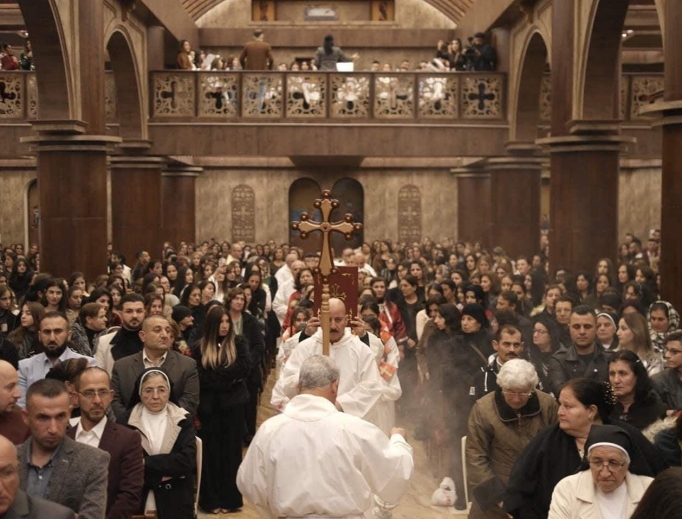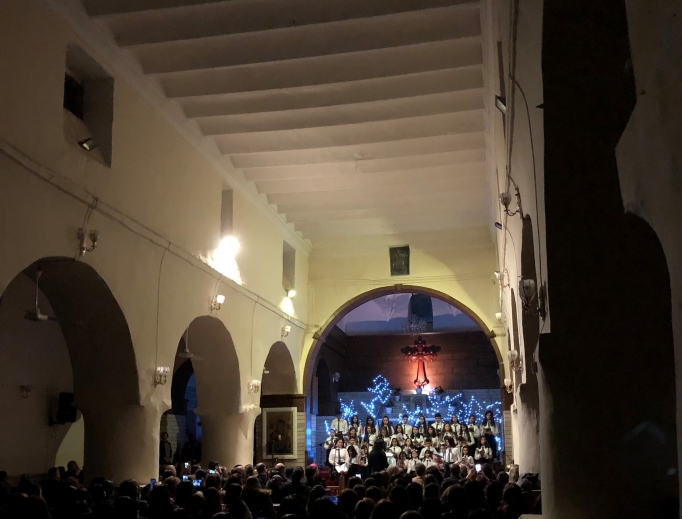Christians Cling to Christmas Hope Amid Turkish Threat and a Fading ISIS
Christians in the Middle East seek to provide a witness of hope as old threats linger and newer ones emerge this Christmas.

QAMISHLI, Syria — Across Syria, Lebanon and Iraq, Christians prepare for the coming of Jesus Christ, praying for peace amid the shadows cast by the remnants of the Islamic State (ISIS), Turkey’s armed forces and widespread protests calling for a new dawn for the Middle East.
Qamishli is a city famous in Syria for its joyful Christmas celebrations, but this year Christians will celebrate Christmas mindful they are on the brink.
“Usually in the past, we used to celebrate Christmas with carnivals roaming the streets, decorating neighborhoods and streets, in addition to parties and youth parties, and visits between relatives and friends to exchange congratulations,” Matthew, a Syrian Christian who asked that his real name be withheld, told the Register.
Last month, ISIS militants killed Father Hovsep Bedoyan, the pastor of Qamishli’s Armenian Catholic community, and his father, adding to the long and bloody list of Syria’s Christian martyrs. Then, three car bombs exploded simultaneously in the city, killing six and injuring 21 people.
“I do not think that Christians in my area this year will celebrate Christmas extensively, but individually, each within his home,” he said. “Everyone is afraid of something bad, in addition to the deteriorating economic situation of most Christians.”
For Qamishli, the Turkish threat on its doorstep is a painful reminder of its history. The city was founded more than 100 years ago by Assyrian and Syriac survivors of Ottoman Turk-sponsored persecutions and today falls within the scope of Turkey’s plan to ethnically cleanse a strip of Syria’s territory in order to create a buffer zone free from Kurdish militia.
Currently, however, Russian Federation gunships and armored vehicles backing the Syrian government army are providing a shield of protection in this part of northeast Syria to Christians, Kurds and other indigenous inhabitants as the U.S. Army withdraws its forces, with the exception of 500 troops and tanks to guard and control Syria’s oil fields. “The security situation has been almost stable,” Matthew noted.
Matthew said, on a practical level, “the Christians in this part of Syria need both prayers and help giving gifts to their poor children, to bring back smiles to their innocent faces for a short period.”
“Christians here hope that goodness, peace and security prevail in our beloved country, Syria, just as they wish for the end of this grinding war that spanned almost nine years and which left many tragedies for many people,” he said.
Syria has endured a long, bloody internal conflict since an armed uprising began in March 2011 that drew in regional rivals, such as the Sunni Arab Gulf States and Iran, with its Lebanese ally Hezbollah, and geopolitical rivals, notably including the U.S. and Russia. And, at the height of its power in 2015, ISIS’ Islamist regime controlled around a quarter of Syria’s territory. However, the Syrian government under President Bashar Assad has endured, recapturing most Syrian territory with the exception of the rebel-controlled Idlib province and some border territories occupied by Turkey’s military and their Syrian Sunni Arab rebel forces.
As a result of President Trump’s order to pull out of northeast Syria on Oct. 6, giving Turkey a free hand to attack the Kurdish forces that helped the U.S. fight and largely defeat ISIS, the Syrian government is now negotiating with the Kurds to abandon their dream of an autonomous zone in northeast Syria and instead rejoin the territory to the Syrian state in order to avoid mass slaughter at the hands of the militarily dominant Turks.
Turkey’s presence within Syria is a great source of unease for Syrians, not just Christians.
“What we are afraid of is that Turkey may remain within the border of our country to take it apart,” explained Archbishop Jean-Clément Jeanbart, the Melkite Greek Catholic archbishop of Aleppo.
Memories of Turkey’s ravages across the landscape of the Middle East it once dominated until the Arab revolt remain.
The archbishop said Turkey’s president, Recep Erdogan, is a “fanatic Islamist” who is neither good for Christians nor Syria.
Still, he hoped that the Christians in Aleppo would be able to set aside their current sorrows, if briefly, to celebrate Christmas.
However, Christians in Syria are feeling the brunt of economic sanctions imposed by the U.S. and other Western powers since March 2011, after the government violently responded to protests calling for reform and the removal of President Assad from power.
In November 2018, the U.S. government intensified sanctions on Syria and its backer Iran, making it even more difficult to reconstruct the country so long as Assad remains president. (Matthew told the Register that in Qamishli, 800 Syrian pounds equals $1 of goods on the black market.)
Archbishop Jeanbart also asked for prayers and for Catholics to request their government remove the sanctions that are causing widespread economic suffering, “so people may come back and no longer leave.”
“We want to have life here with our own work,” he said, explaining Syria’s Christians want that opportunity and not a life constantly supported by donations and international aid.
“We stay here to be a witness to [Jesus’] love and friendship,” he said.
“We have to give Christ to our neighbors.”
Lebanon’s Protests
Habib Malik, a history and cultural studies professor at Lebanese American University, based in Beirut and Byblos, told the Register that the U.S. and Europe need to prevent Lebanon from experiencing the kind of collapse that has engulfed the Middle East.
Lebanon, the only Middle East country with a Christian head of state and guaranteed freedoms for Christians under its sectarian constitution, is the keystone of the Middle East’s future for Christians, as Malik explained that Lebanon models how sectarian coexistence is possible in a modern state.
But, for years, Lebanon has struggled under the strain of hosting Syria’s refugees and the deteriorating economic conditions. Malik said the Lebanese need Syrians to return now that the fighting has ceased in most of the country.
At present, Lebanon is experiencing economic insecurity due to the plundering of its corrupt political class. Malik said everyone is seeing their buying power eaten up by inflation. The cost of an imported Christmas tree from Europe is now $200.
“Christians will do their best to celebrate Christmas. It’s just not going to be a very happy Christmas,” he said.
At present, Lebanese Christians and Muslims are protesting their conditions with creative, nonviolent protests, demanding the replacement of corrupt government officials. Many Shiite Muslims are now openly criticizing Hezbollah, and Malik said that if Europe and the U.S. support the protesters, it “sets limits on what Hezbollah can do.”
Malik said the new impending danger to the stability of the Middle East is Turkey under Erdogan’s leadership. Unlike the Saudis, Malik explained, Erdogan cannot be reined in by Washington.
Turkey’s invasion on Oct. 9 immediately provoked mass displacement, raising the specter of refugees flooding nearby countries that cannot handle any more displaced persons.
“He thinks he’s a neo-Ottoman sultan, but this time with a very clear Muslim Brotherhood ideology,” he said, referring to Erdogan’s brand of political Islam that has eroded the secular state in Turkey and is aimed at recapturing Turkey’s lost political and spiritual hegemony over the Middle East. The transnational Sunni organization is considered a terrorist organization in Egypt, Syria and Saudi Arabia.
All Iraq Wants Is Peace
Five years ago, the bells ceased to ring for Christmas on the Nineveh Plain, the ancestral homeland of Iraq’s Christians. With the fall of ISIS, Christmas has returned, but Christians still face a great deal of uncertainty.
Chaldean Catholic Archbishop Bashar Warda of Erbil told the Register that the security situation for Christians varies from place to place.
And while “the ISIS mentality still remains,” the small numbers of fighters that have emerged have not struck any Christian towns.
“Within the Christian communities, however, we do have some positive signs for economic improvement because of the support we are receiving from our friends outside Iraq,” he said.
“This includes the building and operation of schools, medical facilities and other small businesses, which provide employment to the communities.”
But the overall economic situation is still “very difficult,” Archbishop Warda said, and the biggest reason is the “overall instability of Iraq.”
Thousands of Iraqis have engaged in popular nonviolent protests since Oct. 1, calling for massive reforms to the U.S.-crafted sectarian constitution and the end of Iran’s influence.
More than 500 Iraqis have been killed and 17,000 wounded by either security forces or Iranian-backed militia since the protests began, according to estimates.
The Church in Iraq, along with other leading religious figures, is expressing its solidarity with the people.
“It should be understood that these protests are coming from the entire fabric of Iraq, so much of which has been marginalized over the past decades,” Archbishop Warda said.
“These are very dangerous and uncertain times for the future of all Iraqis, not just Christians.”
Father Salar Kajo, a Chaldean Catholic priest in Teleskov, told the Register that Chaldean Catholic Patriarch Louis Sako has directed that all Christmas displays and ceremonies “should be subdued and respectful of the tragic and serious times the country is facing.”
“Of course we will still celebrate within our homes and churches and with our families this special time of year,” said Father Kajo.
“For Iraqis, family, community and the Church are so important to us, and especially at this time. Everything in this season revolves around these things, which are really all as one to us.”
He said the people will pray for the same thing this year and every year: “that peace and brotherhood may finally come to our country and our people.”
Archbishop Warda added, “The most important gift we can receive from the U.S. and the Church there is to pray for us. Remember us — please do not forget us.”
“In the difficulties we face in the Church today, whether there in the U.S. or here in the Middle East, we are all joined together in faith, a faith which has always overcome the most difficult times,” he said. “Let us all take heart from this, and let us all pray for peace on Earth and goodwill towards all people.”


Peter Jesserer Smith is a Register staff writer.

















